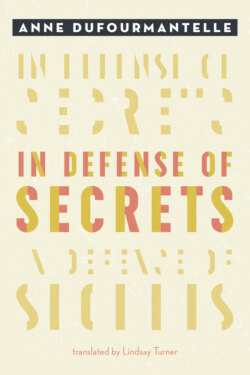Читать книгу In Defense of Secrets - Anne Dufourmantelle - Страница 15
На сайте Литреса книга снята с продажи.
ОглавлениеLifting the Veil
The unconscious was “invented” in an attempt to resolve the question of a certain secret of the body: the secret that concerns our desire and its avatars (the figures of its imaginary). What do we know about what overwhelms us, terrifies us, causes us to desire? About what provokes our courage, our cowardice, about what gives birth to our resolutions? About what has permitted the calculation of an equation previously left unsolved? Freud’s (and Schopenhauer’s) invention of a subregime of consciousness better equipped to take charge of desire, and therefore forcing the consciousness to deal with it at its own expense, is still timely. Beyond the horrors of wars and the acceleration of time in the technological sphere, the twentieth century invented cinema and the unconscious at the same time: the camera obscura. Freud initiated a trial of consciousness that went even further than Sartre would risk. The entire panoply of human anxieties was invited to come confess itself on his couch. But psychoanalysis’s parting of the waters of consciousness had strange fortunes. Taking on family secrets, secrets of incest and intimate life in general, certainly psychoanalysis helped give these over to the “enemy.” An arsenal of medicines and quick diagnostics was tasked with overcoming them faster and better than the talking cure.
The science of the unconscious, psychoanalysis takes as a premise that there exists in us a secret power that is revealed in our dreams, our bungled actions, our slips—a truth we wish to know nothing about. It supposes, equally, that to lift the veil that covers sexuality, shame, fantasy, and jouissance is to have the subject come to themselves in another way, more ample, more fecund, more thoughtful. The lifting of secrets is its backroom—its passion, in a way. And yet to go toward self-knowledge does not mean to succumb to a tyrannical desire to know everything about the other; it is perhaps even the opposite. The ethics of psychoanalysis assumes that it is possible to “choose.” If the unconscious is the first secret of consciousness, how to find the path of its unveilings without violating that essential presence in us which guards the intimate and protects its richness, its subtleness, its universe?
Those who create know this; they do not venture without apprehension down those paths of understanding that might cost them their art. Lou Andreas Salomé, for example, protected Rilke against analysis, dissuading him from going to Freud. According to the manner in which it is repressed, the same element can come to poison a lineage or—on the contrary—to deliver a creative destiny. One day a woman—not a patient—told me the story of her husband, a renowned painter, who was deported with his mother at the age of eighteen months and who then survived in a camp until the age of five. He was hidden thanks to the solidarity of women who worked in a bullet factory. In the morning, his mother would leave him a crust of bread for the day, and he would keep it untouched until her return in the evening. In the almost constant night of his hiding place, there was a small skylight high above him, the only point of light on the horizon. And in the painter’s canvases, all abstract, we can still find this square, present every time. This is not the revelation of his secret, but it has something to do with the essential secret of his being, woven by his subjective history, by History writ large, and by memory.
The wager of psychoanalysis postulates that desire is exposed to the light of day in each word pronounced, each gesture performed, each intention, each sign—but that no one hears it, and certainly not you. It is sometimes simply a trick, an evasion, a simulacrum, a diversion, a code, a sign, a side path. To the analyst, we complain that our existence doesn’t resemble us. They become a witness. Destiny overwhelms us; it is another name for chance, misfortune, lack of recognition, unrequited love. We can’t see where we are, and this disorder of affect, regret, expectation, and evasion betrays us. It is the expression of life in us.
Life is not the ego or even our existence. It is “gold,” or it is a “well.” Obstructed (the well) or buried (gold), it determines our existence, inflects our acts, arms our intentions, or irrigates our thoughts, even though we might not have access to it. And yet we are the ones who lead the dance. This is our life, and in the radical misrecognition of our desire there is so much suffering and so little liberty. It is thus urgent to hear this secret life, to recognize the strain of its song in the ambient noise, to pick out its rhythm, its power, its tonality, its singularity, so as no longer ourselves to be—as the French language expresses so well—au secret: both in solitary confinement and secret, hidden.
